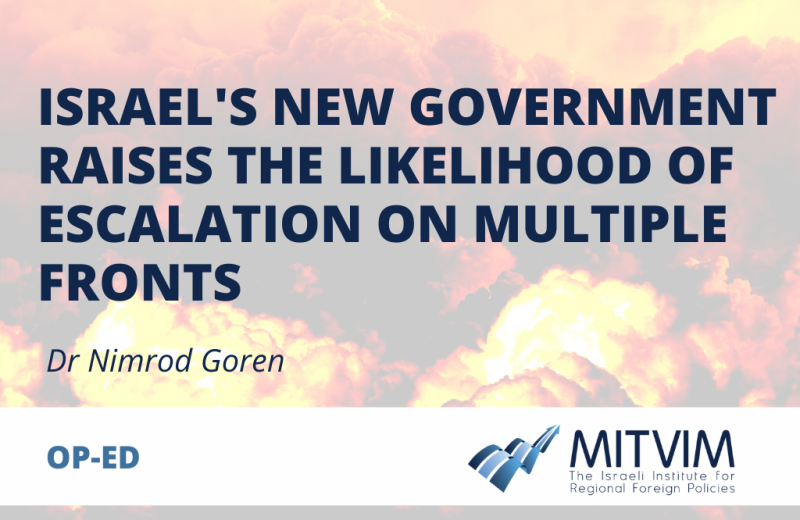 Op-eds
/ The Israeli-Palestinian Peace Process
Op-eds
/ The Israeli-Palestinian Peace Process
The new Israeli government is unprecedented in terms of its extremist composition and declared policy intentions. The coming to power of such a government raises the likelihood of escalation on multiple fronts — domestically, with the Palestinians, and regionally. While some degree of escalation may be unavoidable, its sequence and intensity could be shaped by the actions of Israeli and international actors.
Benjamin Netanyahu begins his current term as prime minister with a domestic focus, and with a sense of urgency that relates to a personal, not national, issue. Seeking a way out of his corruption trial seems to be his top priority. This dictated which parties became part of the coalition, and which policy directives are advanced first.
In his first months in office, Netanyahu is likely to promote the judicial reforms announced by Justice Minister Yariv Levin. If approved, these reforms will dramatically undermine Israeli democracy, and that is already generating significant pushback and causing deep polarization within Israel.
Domestic escalation is therefore coming first. It seems to be a price Netanyahu is willing to pay to solve his personal legal problems and consolidate power. While doing so, he will be seeking international legitimacy and regional stability, to give him more room to maneuver domestically and to counter claims that the government damages Israel’s global standing. For that reason, Netanyahu may be willing to abide by certain redlines conveyed by the Biden administration (for example, on settlements and Jerusalem).
Things have initially been going Netanyahu’s way on the international front. Arab leaders have shown interest in continuing to cooperate with his government, a White House visit is reportedly in the works, and the European Union has expressed a desire to continue the high-level dialogue it launched with former Prime Minister Yair Lapid. While international actors are raising red flags and voicing genuine concerns, many of them are adopting an almost “business-as-usual” approach, waiting to see whether the new government takes actions on the Palestinian issue that will necessitate a response.
Netanyahu’s intention was seemingly to make sure that should escalation on the Palestinian front happen, it would only come second. The recent security deterioration, however, indicates that such an escalation is already taking place, even if that was unintended, and might quickly spiral. In any case, Netanyahu remains determined to block any prospect of a future Palestinian state and has handed authorities related to the West Bank to far-right politicians. Netanyahu may limit them somewhat at first — for the sake of avoiding international crises or regional troubles — but eventually they are likely to carry out provocations in Jerusalem and work to deepen and broaden Israeli control over the Palestinian territories. Such developments might lead to further escalation, especially during the sensitive overlap (in April) between Passover and Ramadan.
An Israeli-Palestinian flare-up could be a catalyst for the third type of escalation — the regional one. If this were to happen, Arab and Muslim countries would find it difficult to maintain their current level of relations with Israel. Regional countries are likely to respond in different ways, depending on the nature of the conflict that erupts, while trying to hold onto the benefits of increased ties with Israel.
Netanyahu, cherishing his regional achievements and seeking to expand the Abraham Accords, may utilize an Israeli-Palestinian escalation to shake up his coalition. If escalation occurs after his desired legal reform is approved, and if he can blame his far-right coalition partners for the flare-up, he may seek to replace an extremist party in his government with a centrist one. He will frame it as a step to restore security and safeguard Israel-Arab relations — a framing that security-oriented centrists, seeking to “save Israel,” might adhere to.
Considering these potential developments, and in an attempt to shape them for the better, the international community should already put in place de-escalation mechanisms, conceive of preventive and proactive diplomatic steps it can take, and step up its support for those in Israel pushing back against democratic erosion.
The article was published in MEI@75 on Janurary 30.


